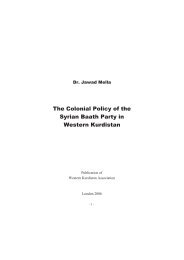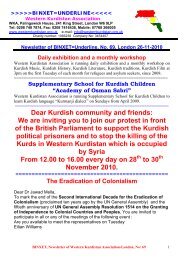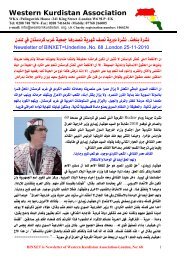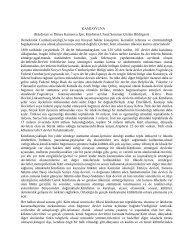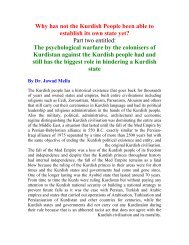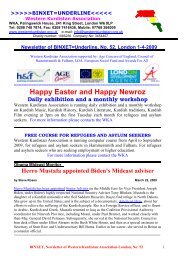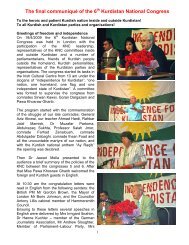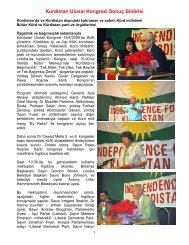- Page 1 and 2:
Dr. Jawad Mella Kurdistan and The K
- Page 3 and 4:
This book is dedicated to: The soul
- Page 5 and 6:
Acknowledgement I thank everyone wh
- Page 7 and 8:
Contents Foreword by Dr. Jemal Nebe
- Page 9 and 10:
Foreword regarding this book and it
- Page 11 and 12:
Introduction Although I have writte
- Page 13 and 14:
that the Turkish generals and Iraq
- Page 15 and 16:
of a massive audience from the repr
- Page 17 and 18:
Necessary Words The Kurdish Questio
- Page 19 and 20:
Part One Kurdistan and Kurdish Soci
- Page 21 and 22:
Chapter I Kurdistan; Geography and
- Page 23 and 24:
For example, crude oil is extracted
- Page 25 and 26:
• Kurds in the Northern Kurdistan
- Page 27 and 28:
Chapter II Social and economic life
- Page 29 and 30:
the book of Major Soane “To Mesop
- Page 31 and 32:
materials from Kurdistan and sell t
- Page 33 and 34:
Chapter III Spiritual Life, Religio
- Page 35 and 36:
y fear of their own personal gains
- Page 37 and 38:
demanded his hand over. Sheikh Abde
- Page 39 and 40:
the Soviet Union, they took part in
- Page 41 and 42:
Chapter IV The Kurdish Language and
- Page 43 and 44:
Union use the Cyrillic alphabet and
- Page 45 and 46:
through different stages of the str
- Page 47 and 48:
oriented content and that it should
- Page 49 and 50:
In short, literature should guide a
- Page 51 and 52:
Part Two The Kurds in History Chapt
- Page 53 and 54:
Chapter I Kurdish Governments from
- Page 55 and 56:
conquered Babylon and established a
- Page 57 and 58:
conquering the Assyrian Empire and
- Page 59 and 60:
Kurdistan as a result, such as Mith
- Page 61 and 62:
Chapter II The Kurdish Governments
- Page 63 and 64:
established in the north of Azerbai
- Page 65 and 66:
Hassankifa and brother in law of Sh
- Page 67 and 68:
war situations. 2- Batlis governmen
- Page 69 and 70:
greet the Shah. On arrival the Shah
- Page 71 and 72:
Kurdistan fell under the Turkish oc
- Page 73 and 74:
Chapter III The Kurdish Revolutions
- Page 75 and 76:
always a sign and real and only exp
- Page 77 and 78: Prince Baderkhan the Great. It is v
- Page 79 and 80: All these were among the factors th
- Page 81 and 82: Part Three The Kurdish Governments
- Page 83 and 84: Chapter I The Kurdish Revolutions a
- Page 85 and 86: authorities under the name Komeley
- Page 87 and 88: a result, the Iranian security forc
- Page 89 and 90: Chapter II The Revolutions and the
- Page 91 and 92: and the newspaper mentioned in its
- Page 93 and 94: 1927. This document is living proof
- Page 95 and 96: alternative treaty of Lausanne of 1
- Page 97 and 98: most of the Kurdish intellectuals a
- Page 99 and 100: Lazarev, "Kurdistan", page 301). Th
- Page 101 and 102: (“Association of Spreading Kurdis
- Page 103 and 104: them and eliminate them one after t
- Page 105 and 106: enowned for their racism and unjust
- Page 107 and 108: Turks in a barbaric manner using al
- Page 109 and 110: strike when their leaders (16 membe
- Page 111 and 112: Kurdistan friends and the entire wo
- Page 113 and 114: said earlier: any Kurdish movement
- Page 115 and 116: Chapter III Western Kurdistan Linke
- Page 117 and 118: the President of the Republic and i
- Page 119 and 120: Mass murder of the Kurdish children
- Page 121 and 122: Ghumar areas to replace the Kurds a
- Page 123 and 124: areas by changing the Kurdish names
- Page 125 and 126: In 1980 the Syrian Intelligence arr
- Page 127: Chapter IV Revolutions and Kurdish
- Page 131 and 132: Revolution that lasted for 14 years
- Page 133 and 134: and after one month from the start
- Page 135 and 136: and isolating it locally and intern
- Page 137 and 138: 355, in regard to the policies of t
- Page 139 and 140: Kurdistan with a logic neglecting t
- Page 141 and 142: In addition to that the Iraqi autho
- Page 143 and 144: Kurdish cause took the first pages
- Page 145 and 146: circumstances of the Kurdish leader
- Page 147 and 148: Part Four The Kurdish Cause Ideolog
- Page 149 and 150: Chapter I The Suggested Solutions F
- Page 151 and 152: those - who exaggerate, according t
- Page 153 and 154: It is the most practical, clear and
- Page 155 and 156: the control of the central governme
- Page 157 and 158: is regarded as a strike against the
- Page 159 and 160: whether angels are male or female,
- Page 161 and 162: However, our position in that regar
- Page 163 and 164: Chapter II Missions Of Kurdish Libe
- Page 165 and 166: their struggle actions just as reac
- Page 167 and 168: the leader of any of those revoluti
- Page 169 and 170: Chapter III Kurdistan And The Inter
- Page 171 and 172: stating: “We have moved from a cl
- Page 173 and 174: arena, as no one has any interest i
- Page 175 and 176: their respective governments allege
- Page 177 and 178: Kurdish-Kurdish fighting. While eve
- Page 179 and 180:
Chapter IV Kurdayeti, The Slogan Of
- Page 181 and 182:
the march of the faithful, and cann
- Page 183 and 184:
I wanted to open the doors to sweat
- Page 185 and 186:
Chapter V The Demand For A Kurdish
- Page 187 and 188:
equivalent to our demission. By est
- Page 189 and 190:
Why a Kurdish state? 1. Any one who
- Page 191 and 192:
and these other Kurds should take t
- Page 193 and 194:
Chapter VI Kurdistan National Congr
- Page 195 and 196:
social, cultural, scientific and po
- Page 197 and 198:
out communications inside Kurdistan
- Page 199 and 200:
CONCLUSION I stated in this book ma
- Page 201 and 202:
wood and its riches. However, the b
- Page 203 and 204:
Appendix 1) This delay in holding t
- Page 205 and 206:
place because Mr. Kendal Nazan was
- Page 207 and 208:
They also cut their intense contact
- Page 209 and 210:
demonstrators killed the Kurdish le
- Page 211 and 212:
Kurds and yet, they call the war: t
- Page 213 and 214:
still infant just after the Turks h
- Page 215 and 216:
personality and was the representat
- Page 217 and 218:
activities because of what was happ
- Page 219 and 220:
Kurdish state would have been a cer
- Page 221 and 222:
century divided between Russia, Pru
- Page 223 and 224:
and Marxists will gain the rights f
- Page 225 and 226:
of Apo because he claimed that Mell
- Page 227 and 228:
DOCUMENTS, PICTURES AND MAPS TREATY
- Page 229 and 230:
This is a complete copy of the most
- Page 231 and 232:
- 231 -
- Page 233 and 234:
THE NATIONAL PACT OF KURDISTAN We t
- Page 235 and 236:
of the Kurdish nation, including th
- Page 237 and 238:
put it under international protecti
- Page 239 and 240:
and opening embassies of the Wester
- Page 241 and 242:
the simplest of human rights. Now t
- Page 243 and 244:
7. Continuous arrest of Kurdish pat
- Page 245 and 246:
Article One AIMS OF THE WESTERN KUR
- Page 247 and 248:
Kurdish nation, with all the neighb
- Page 249 and 250:
that the citizens, organizations an
- Page 251 and 252:
Article Five Budget The budget of t
- Page 253 and 254:
and in the Kurdish and internationa
- Page 255 and 256:
countries that regard themselves as
- Page 257 and 258:
Yours sincerely Dr. Jawad Mella Pre
- Page 259 and 260:
Dr. Jawad Mella Letter on EU Turkis
- Page 261 and 262:
to do that only when there will be
- Page 263 and 264:
Many important letters recieved fro
- Page 265 and 266:
- 265 -
- Page 267 and 268:
- 267 -
- Page 269 and 270:
Memorandum by Kurdish Children in S
- Page 271 and 272:
BEIRUT, June 25 (Reuters) - Syria d
- Page 273 and 274:
hundred demonstrators, including a
- Page 275 and 276:
Statement From The Amnesty Internat
- Page 277 and 278:
KURDISH DEMONSTRATION IN LONDON On
- Page 279 and 280:
- 279 -
- Page 281 and 282:
Three milion Kurds lost their lives
- Page 283 and 284:
Sheikh Latif Mariwani, KNC represen
- Page 285 and 286:
destroying statsues of Hafiz Assad
- Page 287 and 288:
Demonstration of the Western Kurdis
- Page 289 and 290:
Mr. Ibrahim Mella (father of the au
- Page 291 and 292:
Mr. Nizar Mohamed, KNC representati
- Page 293 and 294:
President of Libya His Excellency C
- Page 295 and 296:
President of Kurdistan Republic in



